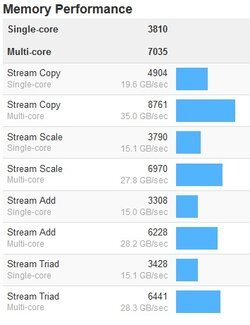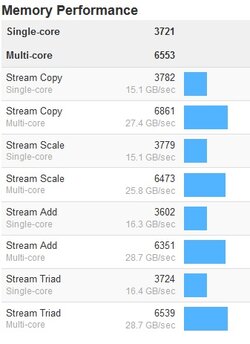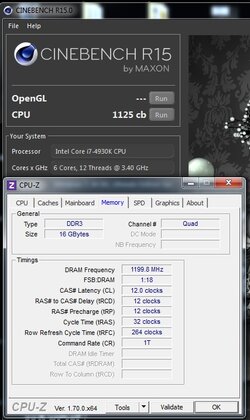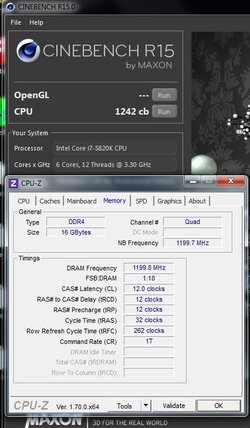Many of you are wondering if DDR4 is really faster as we see on all press releases of new hardware. Since I got 5820K and DDR4 then I can directly compare it to 4930K and DDR3 at the same clocks.
If you wish me to compare these 2 platforms in other benchmarks then please let me know.
Test specifications:
i7 [email protected] / 6 cores , 4x 4GB G.Skill TridentX DDR3 2400 @ 2400 CL12-12-12-32 1N for direct comparison
i7 [email protected] / 6 cores , 4x 4GB Corsair Vengeance DDR4 2666 @ 2400 CL12-12-12-32 1N for direct comparison
I will start from benchmarks that are showing memory bandwidth and CPU is less affecting test results.
We have to still remember that new platform has nearly twice as fast CPU cache.
AIDA64


AIDA64 is showing that memory read and memory copy bandwidth are much slower on DDR4 than on DDR3. These two values are actually most important for system performance.
All AIDA64 tests are multithreaded.
MaxxMem


MaxxMem Preview is a single threaded benchmark and here we see that memory read is again better on DDR3. Other results are better on DDR4 so at least this is good. Somehow it's not so good in multithreaded environment what is more important for daily work.
Winsat
I have Polish test systems so it may look weird for you Anyway what is most important are numbers on the right.
Anyway what is most important are numbers on the right.
Winsat is Windows test which you can run typing "winsat mem" in the command prompt. Simply it's how system sees memory performance.
DDR4 is always on the right ( or below when you are using smaller window ).


I've noticed on some other platforms that Winsat likes memory copy and write bandwidth more than read and we can see that here too. DDR4 is achieving 4GB/second better result than DDR3.
HyperPi 32M


HyperPi base mainly on CPU speed but also likes fast memory. It's hard to compare memory speed here but we see that DDR4 is at least not slowing it down.
These results are on similar memory settings or at least at the same main timings. Of course we can run DDR3 at much tighter timings while tested DDR4 can't run much tighter. Looking at Corsair Vengeance LPX thread we see that 2400 CL12 and 2666 CL13 performance is similar. I couldn't make my Samsung based DDR3 to run at CL13/14 so I used 2400 clock at CL12 for all tests.
Most popular DDR3-2666 kits are running at CL11-13-13 what will give better performance especially that available 2666 DDR4 kits are designed to work at CL15/16 like tested Corsair Vengeance.
A lot depends also from memory controller but it's hard to come any closer in a different platform comparison.
If you wish me to compare these 2 platforms in other benchmarks then please let me know.
Test specifications:
i7 [email protected] / 6 cores , 4x 4GB G.Skill TridentX DDR3 2400 @ 2400 CL12-12-12-32 1N for direct comparison
i7 [email protected] / 6 cores , 4x 4GB Corsair Vengeance DDR4 2666 @ 2400 CL12-12-12-32 1N for direct comparison
I will start from benchmarks that are showing memory bandwidth and CPU is less affecting test results.
We have to still remember that new platform has nearly twice as fast CPU cache.
AIDA64
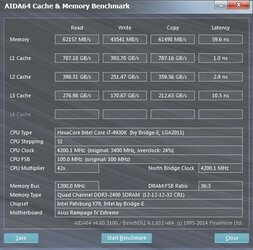
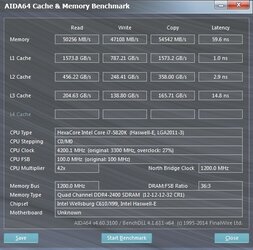
AIDA64 is showing that memory read and memory copy bandwidth are much slower on DDR4 than on DDR3. These two values are actually most important for system performance.
All AIDA64 tests are multithreaded.
MaxxMem
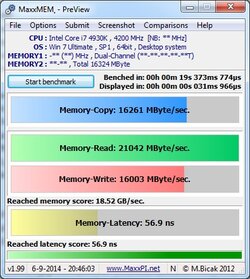
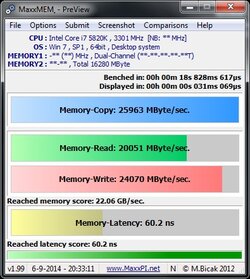
MaxxMem Preview is a single threaded benchmark and here we see that memory read is again better on DDR3. Other results are better on DDR4 so at least this is good. Somehow it's not so good in multithreaded environment what is more important for daily work.
Winsat
I have Polish test systems so it may look weird for you
Winsat is Windows test which you can run typing "winsat mem" in the command prompt. Simply it's how system sees memory performance.
DDR4 is always on the right ( or below when you are using smaller window ).
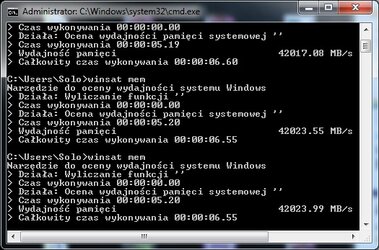
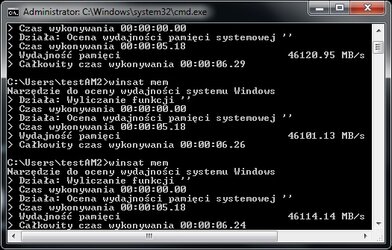
I've noticed on some other platforms that Winsat likes memory copy and write bandwidth more than read and we can see that here too. DDR4 is achieving 4GB/second better result than DDR3.
HyperPi 32M
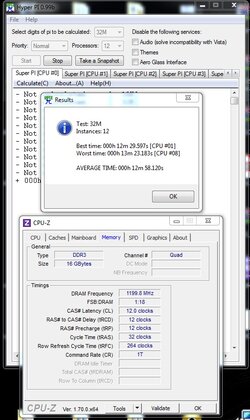
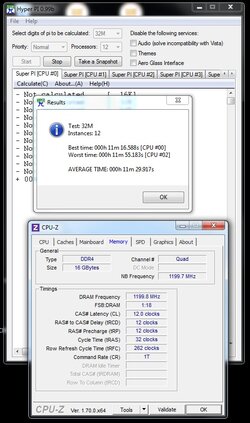
HyperPi base mainly on CPU speed but also likes fast memory. It's hard to compare memory speed here but we see that DDR4 is at least not slowing it down.
These results are on similar memory settings or at least at the same main timings. Of course we can run DDR3 at much tighter timings while tested DDR4 can't run much tighter. Looking at Corsair Vengeance LPX thread we see that 2400 CL12 and 2666 CL13 performance is similar. I couldn't make my Samsung based DDR3 to run at CL13/14 so I used 2400 clock at CL12 for all tests.
Most popular DDR3-2666 kits are running at CL11-13-13 what will give better performance especially that available 2666 DDR4 kits are designed to work at CL15/16 like tested Corsair Vengeance.
A lot depends also from memory controller but it's hard to come any closer in a different platform comparison.
Last edited:
 I don't know how many GPU's you have, but if you could run 3DMark 06 with a R9 AMD GPU and/or CrossFire, it would compare benching power of the new 5820K vs 4930K. As you know 06 is very CPU dependent and the results may be an eye opener to this new tech (5820K) vs older tech (4930K) plus any edge DDR4 will give. Thanks TJ
I don't know how many GPU's you have, but if you could run 3DMark 06 with a R9 AMD GPU and/or CrossFire, it would compare benching power of the new 5820K vs 4930K. As you know 06 is very CPU dependent and the results may be an eye opener to this new tech (5820K) vs older tech (4930K) plus any edge DDR4 will give. Thanks TJ 